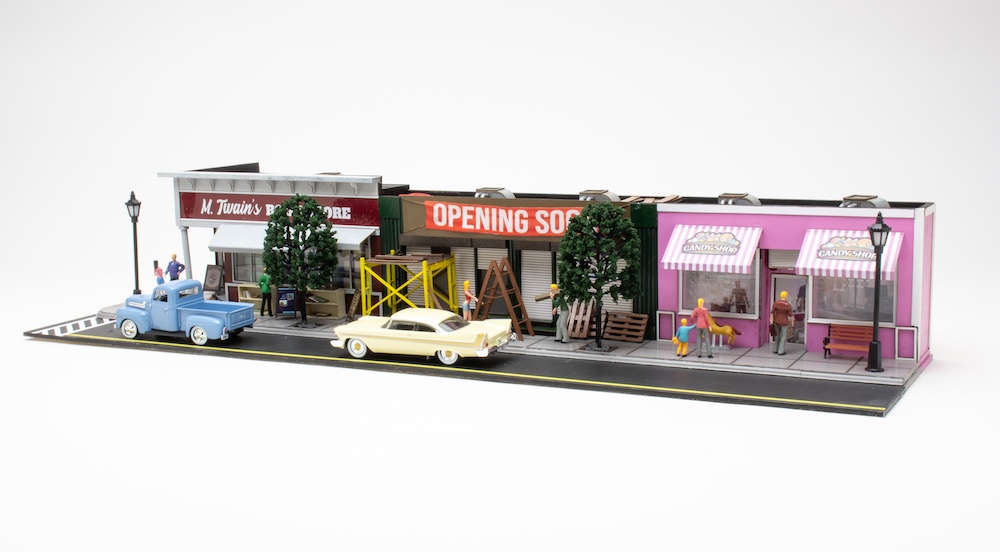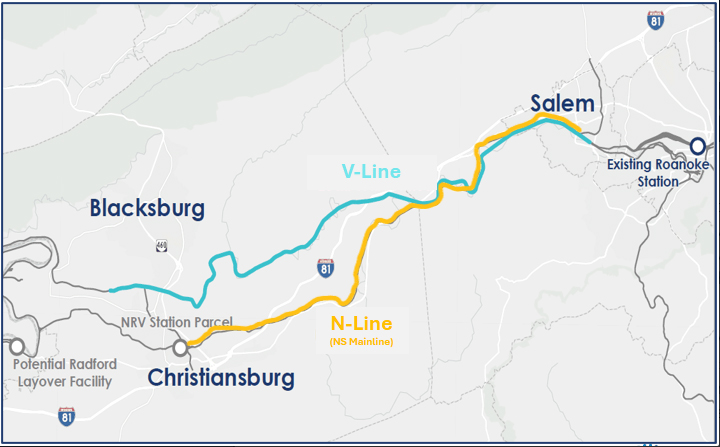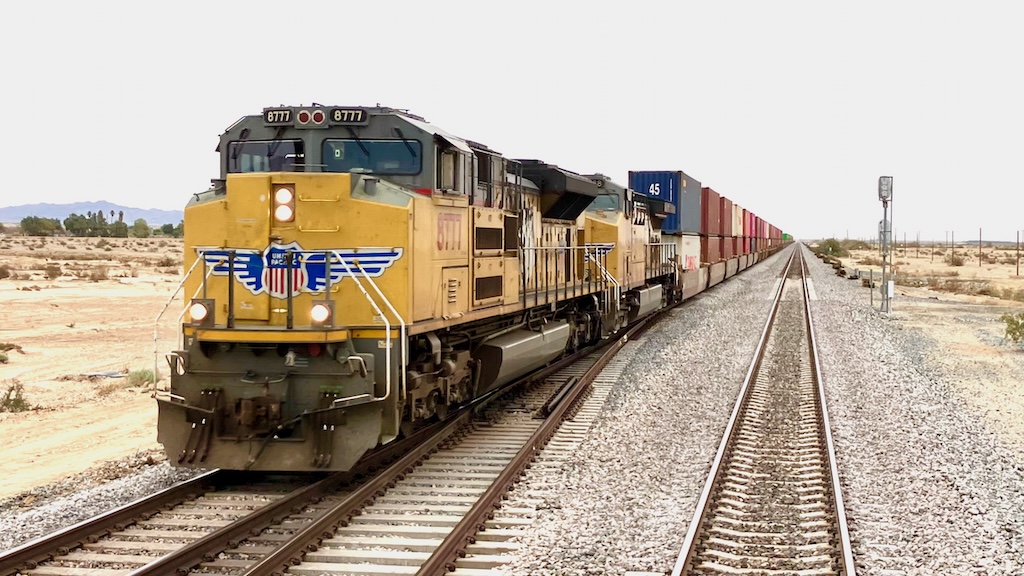 EAGLE, Colo. — Officials in a Colorado county plan to challenge the Surface Transportation Board’s approval of a new rail line in Utah over concerns about resulting crude-oil shipments that will pass through their area.
EAGLE, Colo. — Officials in a Colorado county plan to challenge the Surface Transportation Board’s approval of a new rail line in Utah over concerns about resulting crude-oil shipments that will pass through their area.
The Vail Daily News reports commissioners in Eagle County have approved pursuing action in U.S. District Court, in either Denver or Washington, D.C., in an attempt to block construction of the Uinta Basin Railway, approved by the STB in December [see “STB clears path for Uinta Basin project,” Trains News Wire, Dec. 16, 2021].
At capacity, the new rail line could generate up to 350,000 barrels of oil daily, to be moved by rail. Up to 10 crude-oil unit trains could be funneled east on the Union Pacific’s former Denver & Rio Grande Western line that parallels Interstate 70 or U.S. Route 6 as it passes through Eagle County.
Eagle County Attorney Bryan Treu told the newspaper the commissioners and his office believe the board made “procedural errors” in its approval, including its original decision endorsing the transportation aspect of the progress before the environmental report was completed [see “Digest: STB ruling supports transportation aspect of Uinta Basin project,” News Wire, Jan. 5, 2021]. He also said the decision did not consider “indirect” environmental impacts of the line.














This is the new way to use environmental review laws/procedures to block projects. If the review is approved, then claim it was done wrong, poorly or that “indirect” effects were not considered. The environmental impact report only had to consider the effects of the construction of the new rail line. Not what happens once traffic from that line joins the existing rail network. As another commentator noted, Eagle County doesn’t seem to care about the likely hundreds of trucks per week that pass along I-70 carrying oil, natural gas, gasoline, chemicals, etc. Those trucks are more likely to meet mishap from failing brakes on the Vail Pass grades or jacknifes from snow that these trains derailing.
These NIMBYs are so into themselves, they think they have a say in what happens a state away. They prefer a loss of economic development (tax base increase), loss of potential jobs, loss of energy independence, etc.
I propose the Unitah waybill one car to Vail so they can draw off the waxy components to make candles to light their McMansions, then they can feel better about themselves.
We’ll, obviously it’s completely uneconomical to ship this oil by train over this route. Clearly, the investors have no interest in making money on the venture. They must need a tax write off…
OK, yes, John Rice, John Ayer, and Maynard Stowe, this is the heart of the issue. Why spend all that money on a new rail line for this stuff?
I still don’t see the economics of this bitumen coming out of Utah. It’s very low grade (waxy) oil and it takes a lot of refining to make it useful. It fetches very low per barrel prices on the open market. CN & CP just signed long term agreements to ship Alberta bitumen to all comers in North America.
CPKC post merger will be taking Albertan bitumen to the Petro Coast in Texas/Louisiana and Mexico.
So I have to ask, is their really enough demand in the entire NA for all of this low grade oil?
An API 42-52 light, sweet, zero metals, zero TAN crude is “bitumen”? If it is very low grade, and fetches very low prices per barrel, why is it currently selling in unit train volumes for WTI+4, FOB US Gulf Coast? If it takes a lot of refining, why are major refiners bypassing the crude unit with it, going straight to the FCC, and achieving a better crack spread than they can with any blend of LLS, Permian, Eagle Ford, or Bakken with Mars, Mayan, or WCS?
Translation please.
Translation: “That’s some good stuff, Maynard!”
Hehe! Mr. Stowe, I never noticed your name was actually Maynard! I don’t know where it came from, some old commercial or something, but I’ve been using that saying for decades. So no disrespect intended!
Sorry for calling it “bitumen” which for me simply means low grade oil. I looked up the historical market prices for this type of oil and it goes to near zero when WTI hits the bottom. When I see this type of pricing being so elastic compared to other oil types like Brent and WTI, etc. it tells me that the market for it is very low. If demand was steady or high, its price relative to other benchmarks would vary. But it doesn’t, it floats on a chart at the same rate as the others.
So if we go into another oil glut (and based on EV adoption, we eventually will) this type of oil will become extremely uneconomic. Deliveries will stop and the rails will get rusty. Someone is going to lose a lot of money.
Caution! NIMBYs at work!
If they succeed, then any area can challenge any new traffic a railroad gets.
No pipelines in the area. And it isn’t any business of the clowns in Vail what goes on in Utah.
As much as I am all for rail, oil belongs in a pipeline, is there no lines nearby that they can tap into to ship the oil.
I know it’s bitumen much like Albertas oil sands but it is done, just costs more due to the need to dilute it first.
It’s not bitumen and not like Alberta oil sands oil. It’s a light, sweet, crude of API 42-52 with a high paraffin (wax) content. It cannot be pipelined over long distances because it has a pour point of 120 F. Below 120 F it solidifies, and looks like a yellow candle. Dilution does not solve the pour point until it becomes 95% diluent, 5% oil. Pipelines can be insulated and heat-traced over short distances but it is very expensive to do so. Neither dilution nor heating is even remotely economic for this oil for pipeline over long distances.
Charles, so melodramatic. But, if only we had a government like China where all are required to think the same. The those Col. folks could be told to shut up or off to the reeducation camp.
I guess the coal shipped through their county was not a risk? Or the hundreds of trucks that pass through every day?
This went on for umpteen months and now they want to challenge it?
Actually, they have been challenging it since Day 1. Now that the STB has ruled they have to start a different legal path to block it.
OK, then, no petrol for your county. No petrol cars, no food delivery, no oil heating, no commerce …. Enjoy your return to the depths of the Middle Ages.